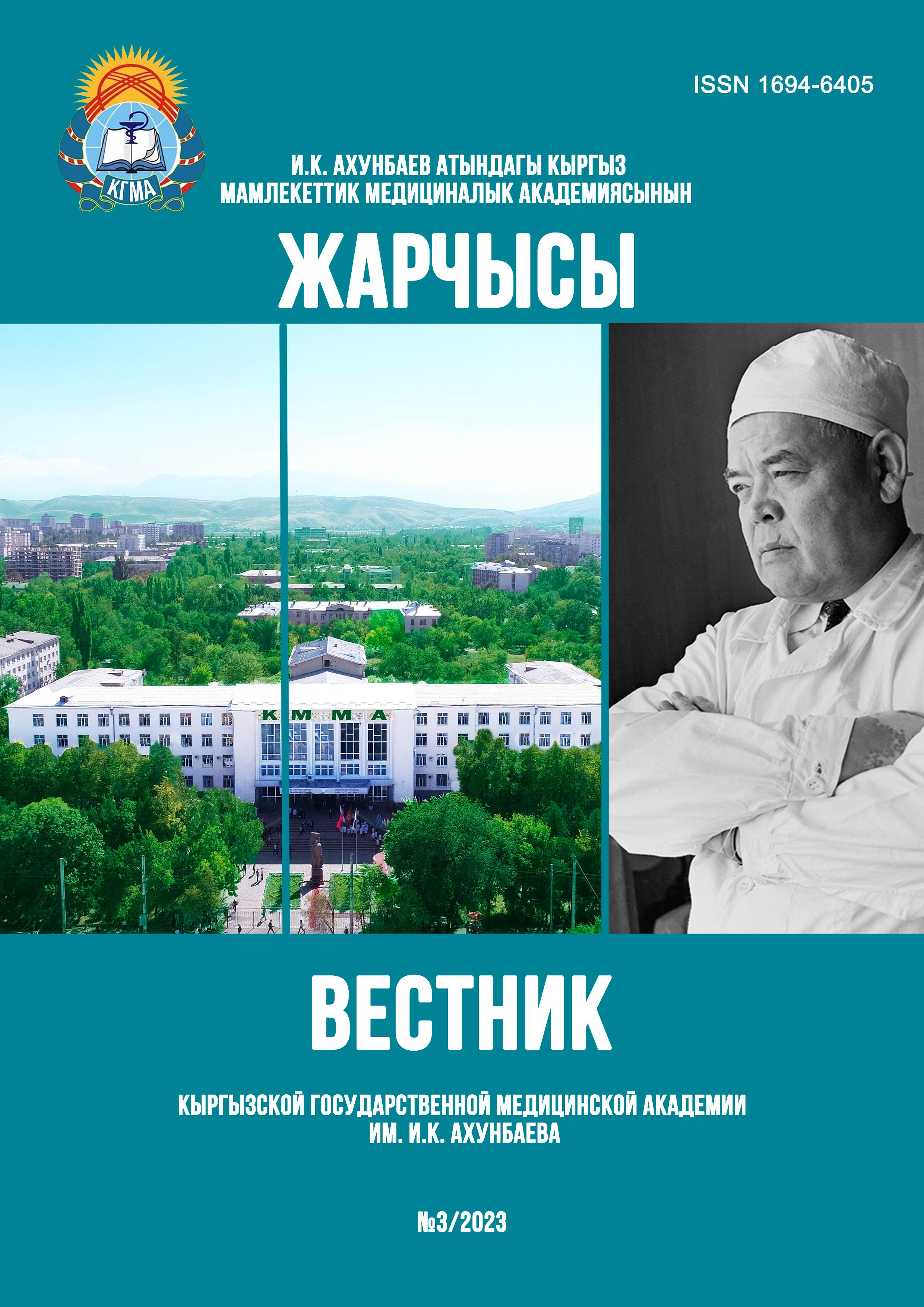FEATURES OF MANAGEMENT OF PREGNANT WOMEN WITH UROLITHIASIS WITH THE SELECTION OF TREATMENT TACTICS
DOI:
https://doi.org/10.54890/1694-6405_2023_3_124Abstract
Urolithiasis is the most common cause of urological abdominal pain in pregnant women who have had urinary tract infections. During pregnancy, the frequency of localization of stones in the ureter is twice as high as in the renal pelvis or calyces, but there is no difference between the left and right kidney or ureter. The aim of the work was to improve the results of diagnosis, treatment and ways to prevent complications of urolithiasis during pregnancy. The study was conducted at the Department of Urology and Nephrology with a course of hemodialysis of the KSMIPiPK named after A.I. S.B. Daniyarov and departments of urology of the National Hospital of the MZKR. For the period from November 2022 to April 2023, 42 pregnant women with a gestational age of 12 to 24 weeks, who were in the Republican Scientific Center of the Center for Urology of the NSMZKR, suffering from urolithiasis, were examined. In 27 (64%) patients, this pregnancy was the first, in 11 (26%) repeated. In 35 (83%) women, urolithiasis was diagnosed for the first time, in 7 (17%) pregnant women, the duration of urolithiasis was from 3 to 5 years. Thus, among the pregnant women who applied for urolithiasis, ureteral stones were detected in 12 (29%), in 10 (24%) pregnant women the stones were localized in the kidney, in 16 (38%) pregnant women the stones were localized in the pelvis. In 4 (9%) pregnant women there were no urinary outflow disorders, but uric acid diathesis was observed. In connection with the accurate diagnosis of the localization of stones, a combined treatment was selected (operative + conservative), according to the protocols for the treatment of urolithiasis, while the most informative and minimally invasive diagnostic method for urolithiasis in pregnant women is ultrasound.
Patients from the first group with caliceal stones without impaired urine outflow in the absence of an active inflammatory process do not need special treatment, and with a pronounced inflammatory process, it becomes necessary to connect antibiotic therapy, drainage of the kidney by installing a stent, with detoxification therapy. Conclusion Thus, minimally invasive surgical methods for the treatment of urolithiasis can be effectively used at gestational ages from 12 to 24 weeks. Indications for surgical intervention for obstructive urinary tract stones during pregnancy should be strict. Temporary restoration of urine outflow by placement of a renal stent is preferable. The tactics of active treatment and administration of urolithiasis during gestation can reduce the number of complications during pregnancy with urolithiasis.
Keywords:
Urolithiasis, pregnancy, pyelonephritis of pregnant women, pregnancy with urolithiasis.References
1. Усупбаев А.Ч., Садырбеков Н.Ж., Исаев Н.А., Оскон уулу Айбек. Химический состав почечных камней. Здравоохранение Кыргызстана. 2011;2:209-212.
2. Усупбаев А.Ч., Маматбеков Р.А., Исаев Н.А. Современное состояние проблем мочекаменной болезни в Кыргызской республике. Вестник КГМА им. И.К. Ахунбаева. 2017;3:101-111.
3. Clennon EK, Duty BD, Caughey AB. Cost-Effectiveness of Urolithiasis Management in Pregnancy. Urology Practice. 2019;6(6):337-344. https://doi.org/10.1097/UPJ.0000000000000046
4. Drescher M, Blackwell R, Patel P, Hart S, Kandabarow A, Kuo P et al. Urolithiasis in pregnancy: does an antepartum stone admission increase the risk of preterm delivery? Journal of Urology. 2018;199(4c):e675. https://doi.org/10.1016/j.juro.2018.02.1612
5. Sohlberg E, Brubaker W, Zhang CA, Dallas K, Ganesan C, Song S. The epidemiology of urinary stone disease in pregnancy: a claims-based analysis of 1.2 million patients. Journal of Urology. 2019;201(4):e846-e846. https://doi.org/10.1097/01.JU.0000556776.84735.ac
6. Nizin P, Kotov S, Perov R. Comparison of the effect of active surgical treatment of urolithiasis in pregnant patients compared with serial ureteral stenting on the probability of natural delivery. Journal of Urology. 2022;5:e240. https://doi.org/10.1097/JU.0000000000002543.20
7. Dai JC, Nicholson TM, Chang HC, Desai AC, Sweet RM, Harper JD et al. Nephrolithiasis in Pregnancy: Treating for Two. Urology. 2021;151:44-53. https://doi.org/10.1016/j.urology.2020.06.097
8. Valovska M-TI, Pais VM. Contemporary best practice urolithiasis in pregnancy. Therapeutic Advances in Urology. 2018;10(4):127-138. https://doi.org/10.1177/1756287218754765
9. Thongprayoon C, Vaughan LE, Chewcharat A, Kattah AG, Enders FT, Kumar R rt al. Risk of Symptomatic Kidney Stones During and After Pregnancy. American J of Kidney Diseases. 2021;78(3):409-417. https://doi.org/10.1053/j.ajkd.2021.01.008
10. Morgan K, Rees CD, Shahait M, Craighead C, Connelly ZM, Ahmed ME et al. Urolithiasis in pregnancy: Advances in imaging modalities and evaluation of current trends in endourological approaches. Actas Urológicas Españolas (English Edition). 2022;46(5):259-267. https://doi.org/10.1016/j.acuroe.2022.03.005
11. Talwar HS, Panwar VK, Ghorai RP, Mittal A. Catastrophic complications of urolithiasis in pregnancy. BMJ Case Reports CP. 2021;14(5):e241597. https://doi.org/10.1136/bcr-2021-241597
12. Spradling K, Zhang ChA, Pao AC, Liao JC, Leppert JT, Elliott ChS et al. Risk of Postpartum Urinary Stone Disease in Women with History of Urinary Stone Disease During Pregnancy. Journal of Endourology. 2022;36(1):138-142. https://doi.org/10.1089/end.2021.0223
13. Juliebø-Jones P, Somani BK, Baug S, Beisland C. Management of Kidney Stone Disease in Pregnancy: A Practical and Evidence-Based Approach. Curr Urol Rep. 2022;23(11):263-270. https://doi.org/10.1007/s11934-022-01112-x
14. Hosseini MM, Hassanpour A, Eslahi A, Malekmakan L. Percutaneous Nephrolithotomy During Early Pregnancy in Urgent Situations: Is It Feasible and Safe? Urology Journal. 2017;14(6):5034-5037. https://doi.org/10.22037/uj.v14i6.3617







